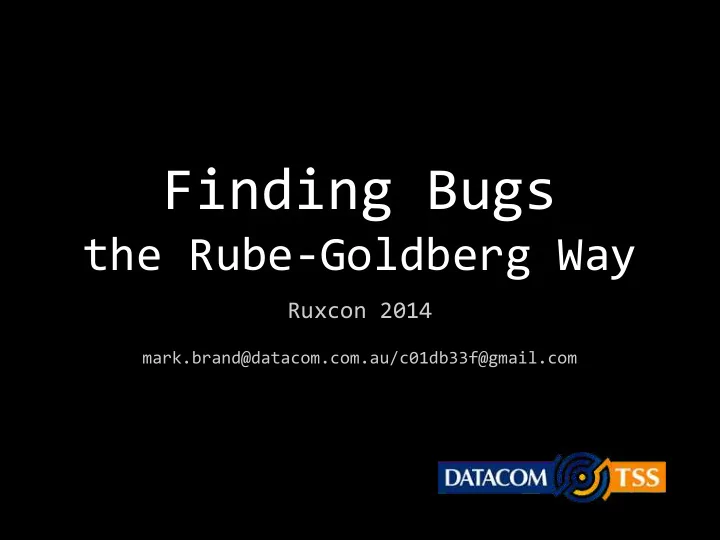

Finding Bugs the Rube-Goldberg Way Ruxcon 2014 mark.brand@datacom.com.au/c01db33f@gmail.com
Me Work - Datacom TSS - pentesting/code auditing/research Play - Same as last year :-P - When I have time, it’s nice to try and break things.
Outline[0] Recap - Last year - Concolic execution for dummies Requirements - What do we need to attack harder problems. - What do we need to do to find *real* bugs?
Outline[1] Debugger-integrated goodness Targetting - What makes a good target for this technique? - What legwork do we need to do? Demos
Recap[0] [*] [0 0x8049128] Wrote 0xb00ff002L recv_0292 return_address [*] [0 0x8049128] Wrote 0xb00ff003L recv_0293 return_address [*] Got full control of instruction pointer [*] Looks like we got control from a return [*] Writing shellcode at esp [*] Pivoting via 0x28134827 [*] Built a small zoo on this binary! [*] Launching exploit against 192.168.91.163:7482 [*] Press any key to throw antipasto@c01db33f-freebsd-91-x86$ id uid=1004(antipasto) gid=1004(antipasto) groups=1004(antipasto) antipasto@c01db33f-freebsd-91-x86$
Recap[1] - Last year Basically a fun toy - Horrific parallelism (fork()) - Static analysis to generate IL Plus, it was PoC quality code …
Recap[2] - Concolic So, concolic execution … - Your fuzzer is concrete - Symbolic is impractical - Concolic is a bit better; you have a get-out-of-jail-free card if things get too hard.
Recap[3] - REIL Arithmetic Instructions ADD, SUB, MUL, DIV, MOD, BSH Bitwise Instructions AND, OR, XOR Data Transfer Instructions LDM, STM, STR Conditional Instructions BISZ, JCC Other Instructions NOP, UNDEF, UNKN
Requirements[0] Speed - Ditching python for C++ was not a good answer to this problem Windows support - Any platform on a supported CPU with a gdbstub?
Requirements[1] Nice-to-have - Dynamic REIL translation - Cluster-able - File-format aware
Targeting[0] What are we better than a human at? - Integer boundaries - Complex pointer arithmetic What are we hopeless at? - Massively complex state-spaces - Heavy use of string functions
Targeting[1] What do we want to look at? - Binary protocols/file formats - Post-crypto or plaintext … - Audio formats? - Image formats? - Fonts?
Approach Started off writing proper, complete ELF and PE loaders. Modern ELF is surprisingly undocumented. Let the system ELF loader handle it … Use LD_BIND_NOW and a debugger.
But If we’re doing stuff dynamically … We can’t rely on static lifting of native code to REIL using IDA and BinNavi. That approach always had some issues anyway; so …
XREIL Extra Comparison Instructions BISNZ, EQU Better Shift Instructions LSHL, LSHR, ASHR Sign Extension SEX System Calls SYS Still under debate SDIV
VDB - Visigoth’s Debugger All python, supports BSD, linux, OSX, Windows and all sorts of embedded systems I hope to never see. Two extension commands: save_state - dump process state for analysis start-point. save_trace - dump a trace for testing/validation
Ogg Vorbis Why? I use it. Ogg is the container format used to frame the Vorbis codestream. Naively trying to run the tools on a fully symbolic file goes nowhere - Ogg format is *very* simple. We want to mess with the metadata and the Vorbis codestream
Hybrid Concolic Fuzzing? Idea - parse the input files, mark the parts that we think are interesting as symbolic, leave the boring stuff as concrete. I was going to do this properly, but time limitations...
Input file …
Output file …
Any Questions? mark.brand@datacom.com.au c01db33f@gmail.com Grab the code … https://github.com/c01db33f
Recommend
More recommend